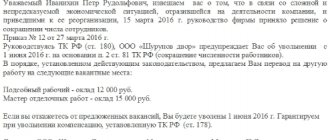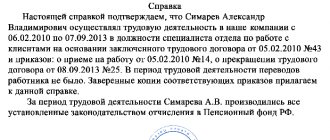There is a fashion among employers to fire workers for no reason, just like that, the master wanted, wanted to punish the “hack”, slashed at them and fired them. Jokes aside! But is this legal? Can they just lose their job? Of course not, to dismiss an employee there must be certain reasons and such reasons are enshrined in law, let's figure out why and in what situations an employer can actually fire an employee!
What could be the reasons for dismissal?
First, let's find out what legal reasons for dismissal at the initiative of the employer are provided for by labor legislation. All of them are listed in Article 81 of the Labor Code of the Russian Federation:
- liquidation of an organization or termination of the activities of an individual entrepreneur;
- reduction of the organization's workforce;
- incompatibility of the employee with the position held or the work performed;
- repeated failure by a person to fulfill job duties without good reason (in the presence of a disciplinary sanction);
- gross violation of labor duties by an employee, even for the first time, if this means showing up at work while intoxicated, absenteeism, disclosing a trade secret or disclosing the personal data of another person;
- committing theft of someone else's property or embezzlement at work (if there is a verdict or court decision);
- violation of labor protection requirements, if it led to serious consequences;
- guilty actions of a financially responsible person, which led to a loss of trust on the part of management;
- presence of an unresolved conflict of interest;
- committing an immoral offense incompatible with the position of a teacher or educator;
- provision of false documents on education, qualifications or experience during employment.
In addition, there are a number of reasons that relate strictly to the leaders of the organization, for example, a change in the owner of the company or the director making an unfounded decision that caused damage to the company. This list is open, since clause 14 of Art. 81 of the Labor Code indicates other reasons determined by federal legislation, which in practice gives the right to expand the list for individual economic entities and institutions. There are no other options. You cannot write in your work book about personal hostility or violation of the dress code. Therefore, the actual reason for dismissal cannot contradict the legally established one.
Features of dismissal of a manager from an organization
As previously mentioned in the article, the procedure for terminating an employment contract with representatives of the organization’s management has a number of features and difficulties. The legal dismissal of a director without explanation must occur in compliance with all labor laws. Typically, the entire process looks like this:
- Before initiating the procedure, a shareholder meeting is held or all owners of the enterprise are convened, who jointly make this decision;
- Shareholders/owners and the head of the organization receive notifications of the time and place of the meeting. The decision is made by voting, based on the results of which a corresponding Protocol is drawn up, certified by the signatures of each voter. At the same meeting, the commission should elect a new director, to whom all the responsibilities and values of the enterprise will be transferred, after the dismissal of the current director;
- On the last day of fulfilling labor obligations, the head of the organization himself issues a corresponding Order to relinquish his powers;
- Next, there is a procedure for the dismissed person to transfer all previously issued commercial valuables and other property of the owner of the organization to a new, previously elected leader. Based on the results of the transfer, the corresponding Act is filled out;
- On the day of dismissal, the employee receives his own work book without indicating the reason for termination of the contract, however, with reference to Article 278 of the labor law;
- The citizen receives the required amount of money, which, in addition to other obligatory payments, includes compensation in the amount of three months’ earnings, as well as any other charges recorded in the internal documentation of the enterprise.
In Russia, the one who knows his rights wins

If you want to know how to solve your specific problem, then ask
our duty
lawyer online
.
It's fast, convenient and free
or by phone:
Moscow and region:+7
St. Petersburg and region:+7
Federal number:+7
Inconsistency with the position held and loss of confidence
Of this long list, the most dangerous for employees can be considered inconsistency with the position held and loss of trust. Other guilty actions of the employee must have documentary evidence, and most citizens know about this. Therefore, they believe that it will not be possible to simply attribute absenteeism to the employer. But loss of trust is a subjective concept and does not require proof. Such a reason for dismissal in the application form can ruin your career.
In reality, everything is completely different. Loss of trust can only be a consequence of proven guilty actions of the employee. Therefore, the director cannot simply decide that he no longer trusts this person. Likewise, he cannot recognize that a person does not meet the requirements of a professional standard or position. Such a conclusion can only be made by a special qualification or certification commission. Therefore, if a person receives threats of this kind, he may not worry if he has not committed any violations and no one has checked his qualifications.
Dismissal procedure
Each paragraph of Article 81 of the Labor Code of the Russian Federation has its own characteristics. A separate case involves its own procedure for dismissal under the article:
- Clause 1 - if the organization ceases to exist, the director is obliged to notify the staff of dismissal at least 14 days before the closure of activities. It is possible to terminate the employment agreement before the specified period with the written consent of the employee. Also, on the last working day, the director must pay severance pay in the amount of the average monthly salary.
- Item 2 - if the production staff is reduced, the previous procedure is maintained, but if possible, alternative vacancies should be offered.
- P. 3 - lack of the necessary specialty or skill may serve as a reason for dismissal under the article. But the procedure obliges management to first conduct a certification test of the employee or offer a position suitable for his professional level.
- Clause 4 - when replacing the owner of an enterprise, the new owner has the right to dismiss only the management team. This includes the general director of the company, his deputy and the chief accountant.
- Clause 5 - systematic violations by an employee require mandatory written confirmation. The first offense requires you to write an explanatory note. Penalties against the employee are possible. Repeated mistakes committed within a maximum of 1 year after the previous one are punishable by a dismissal order.
- Item 6 - a one-time violation must be officially recorded by management using an explanatory statement. It is served within two days. If management decides negatively, severance pay or other vacancies are not available to the dismissed person.
- P. 7 - loss of trust is most often found among accounting and cash settlement departments. If there is written evidence, the employee is subject to dismissal under the article.
- Item 8 - this category includes specialists from educational or educational institutions who exhibit immoral behavior. Gossip, rumors, and speculation are not considered evidence.
- Clause 9 - unnecessary expenses, losses, irrational use of organization funds are punishable by dismissal without benefits.
- Item 10 - gross mistakes by management entail a reduction in position, salary or dismissal with two weeks' notice.
Fired from work without reason: what to do
If illegal dismissal does take place, the employee has every chance to defend his rights. He can contact:
- to the State Labor Inspectorate (SIT);
- to the prosecutor's office;
- to court.
In this case, you can contact three of these places at the same time. This is due to the fact that all three authorities provide different methods of violated rights. If the State Tax Inspectorate and the prosecutor’s office can inspect the organization and issue an administrative fine with an order to eliminate violations, then the court can immediately reinstate the person at work, as well as oblige the employer to pay him compensation for forced absence. The court decision on reinstatement at work by virtue of Articles 394 of the Labor Code of the Russian Federation and 396 of the Labor Code of the Russian Federation must be executed immediately. But a person can go to court on this matter only within one month from the date of delivery of a copy of the order of dismissal from work or from the date of issue of the work book. If he did not receive these documents, the countdown of the period begins from the moment when he became aware (should have become aware) of the violation of his rights. However, such appeals to the court are not subject to state duty.
Legal documents
- Article 81 of the Labor Code of the Russian Federation. Termination of an employment contract at the initiative of the employer
- Article 394 of the Labor Code of the Russian Federation. Making decisions on labor disputes regarding dismissal and transfer to another job
- Article 396 of the Labor Code of the Russian Federation. Execution of decisions on reinstatement
Procedure for reinstatement at work
If the court decides that the dismissal was carried out illegally, a writ of execution is drawn up. According to this document, the head of the legal entity is obliged to restore the employee to his previous position no later than one working day from the moment the writ of execution is received by the bailiffs.
The HR department draws up an order to cancel the order to dismiss the employee, and the employee is familiarized with it. There is no order for reinstatement. Then the employee is informed about the day on which he can begin performing his duties again, and is asked to provide a work book. In it, the last entry is considered invalid and the details of the court decision are indicated. If an employee reinstated wishes to receive a duplicate of the work book with the restoration of all entries made in it, except for the last one about illegal dismissal, the employer is obliged to do this. In a similar way, corrections are made to the employee’s personal card, and adjustments are also made to the time sheet.
It is important that an illegally dismissed employee must be reinstated to his previous position, maintaining the same working conditions, even if the employer has already hired a new person for this position (he is fired) or this position has been reduced (it is restored).
In this way, the employee must be reinstated in his position. However, in practice, not all employers who lose in court want to rehire a legally competent employee into their staff. If the court evades execution of a court decision, the court may additionally fine the enterprise, and if it happens again, make a decision to pay an even larger fine.
On what grounds can you fire an employee?
According to Article 77 of the Labor Code of the Russian Federation, an employment relationship with a person can be terminated only for the following reasons:
- if he himself expressed such a desire;
- if the employer has a legitimate need;
- if the parties reach an agreement and sign an agreement.
The employment agreement cannot be terminated for other reasons. What to do if an employer fires an employee without warning the latter of his intentions? What will happen to him for this and can he be held accountable for such an act?
But there are also circumstances that do not depend on the will of the parties, and which can lead to the severance of the employment relationship. These include:
- expiration of a fixed-term employment agreement;
- making a court decision on this matter;
- the employee was deprived of special knowledge and rights, and he cannot work without them;
- medical certificate on the employee’s health condition prohibiting him from working.








